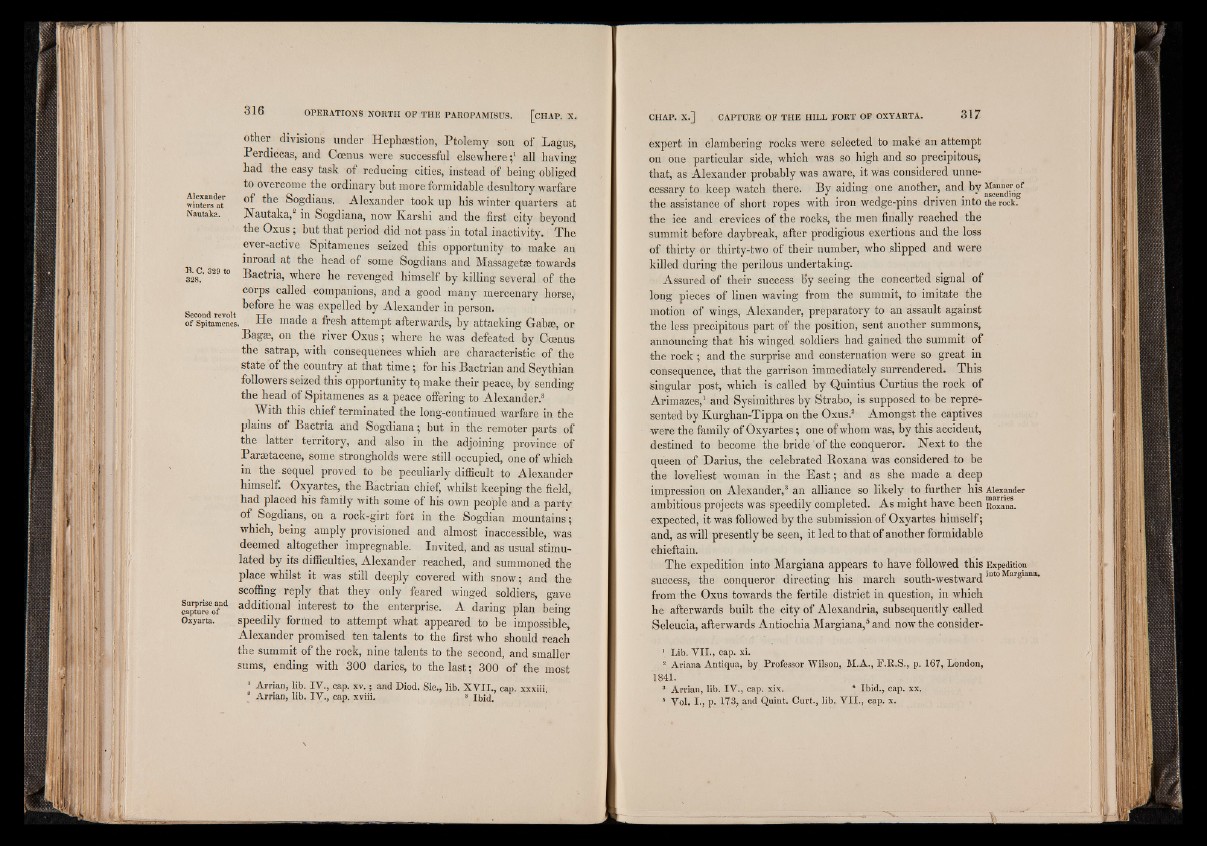
other divisions under Hephsestion, Ptolemy son of Lagus,
Perdiccas, and Ccenus were successful elsewhere;1 all having
had the easy task of reducing cities, instead of being obliged
to overcome the ordinary but more formidable desultory warfare
wintersat* ®°§dians- Alexander took up his winter quarters at
Nautaka. Nautaka,2 in Sogdiana, now Karshi and the first city beyond
the Oxus; but that period did not pass in total inactivity. The
ever-active Spitamenes seized this opportunity to make an
inroad at the head of some Sogdians and Massagetse towards
328.' ~ Bactria, where he revenged himself by killing several of the
corps called companions, and a good many mercenary horse,
Second r t before he was expelled by Alexander in person,
o f Spitamenes. He made a fresh attempt afterwards, by attacking Gabss, or
Bagae, on the river Oxus; where he was defeated by Ccenus
the satrap, with consequences which are characteristic of the
state of the country at that time; for his Bactrian and Scythian
followers seized this opportunity tq make their peace, by sending
the head of Spitamenes as a peace offering to Alexander.3
With this chief terminated the long-continued warfare in the
plains of Bactria and Sogdiana; but in the remoter parts of
the latter territory, and also in the adjoining province of
Paraetacene, some strongholds were still occupied, one of which
in the sequel proved to be peculiarly difficult to Alexander
himself. Oxyartes, the Bactrian chief, whilst keeping the field,
had placed his family with some of his own people and a party
of Sogdians, on a rock-girt fort in the Sogdian mountains;
which, being amply provisioned and almost inaccessible, was
deemed altogether impregnable. Invited, and as usual stimulated
by its difficulties, Alexander reached, and summoned the
place whilst it was still deeply covered with snow; and the
scoffing reply that they only feared winged soldiers, gave
caap?uriofnd additional interest to the enterprise. A daring plan being
O x ja rta . speedily formed to attempt what appeared to be impossible,
Alexander promised ten talents to the first who should reach
the summit of the rock, nine talents to the second, and smaller
sums, ending with 300 darics, to the last; 300 of the most
Arrian, lib. IV ., cap. x v .; and Diod. Sic., lib. X V I I ., cap. xxxiii,
2 Arrian, lib. IV ., cap. xviii. » Ibid.
\
expert in clambering rocks were selected to make an attempt
on one particular side, which was so high and so precipitous,
that, as Alexander probably was aware, it was considered unnecessary
to keep watch there. By aiding one another, and by
the assistance of short ropes with iron wedge-pins driven into the rock,
the ice and crevices of the rocks, the men finally reached the
summit before daybreak, after prodigious exertions and the loss
of thirty or thirty-two of their number, who slipped and were
killed during the perilous undertaking.
Assured of their success Ky seeing the concerted signal of
long pieces of linen waving from the summit, to imitate the
motion of wings, Alexander, preparatory to an assault against
the less precipitous part of the position, sent another summons,
announcing that his winged soldiers had gained the summit of
the rock ; and the surprise and consternation were so great in
consequence, that the garrison immediately surrendered. This
singular post, which is called by Quintius Curtius the rock of
Arimazes,1 and Sysimithres by Strabo, is supposed to be represented
by Kurghan-Tippa on the Oxus.2 Amongst the captives
were the family of Oxyartes; one of whom was, by this accident,
destined to become the bride of the conqueror. Next to the
queen of Darius, the celebrated Roxana was considered to be
the loveliest woman in the East; and as she made a deep
impression on Alexander,3 an alliance so likely to further his Alexander
ambitious projects was speedily completed. As might have been Roxana,
expected, it was followed by the submission of Oxyartes himself;
and, as will presently be seen, it led to that of another formidable
chieftain.
The expedition into Margiana appears to have followed this Expedition
success, the conqueror directing his march south-westwardint0 argiana*
from the Oxus towards the fertile district in question, in which
he afterwards built the city of Alexandria, subsequently called
Seleucia, afterwards Antiochia Margiana,5 and now the consider-
' Lib. V II., cap. xi.
2 Ariana Antiqua, by Professor Wilson, M.A., F.K.S., p. 167, London,
1841.
3 Arrian, lib. IV ., cap. xix. * Ibid., cap. xx.
5 Vol. I ., p. 173, and Quint. Curt., lib. V I I ., cap. x.